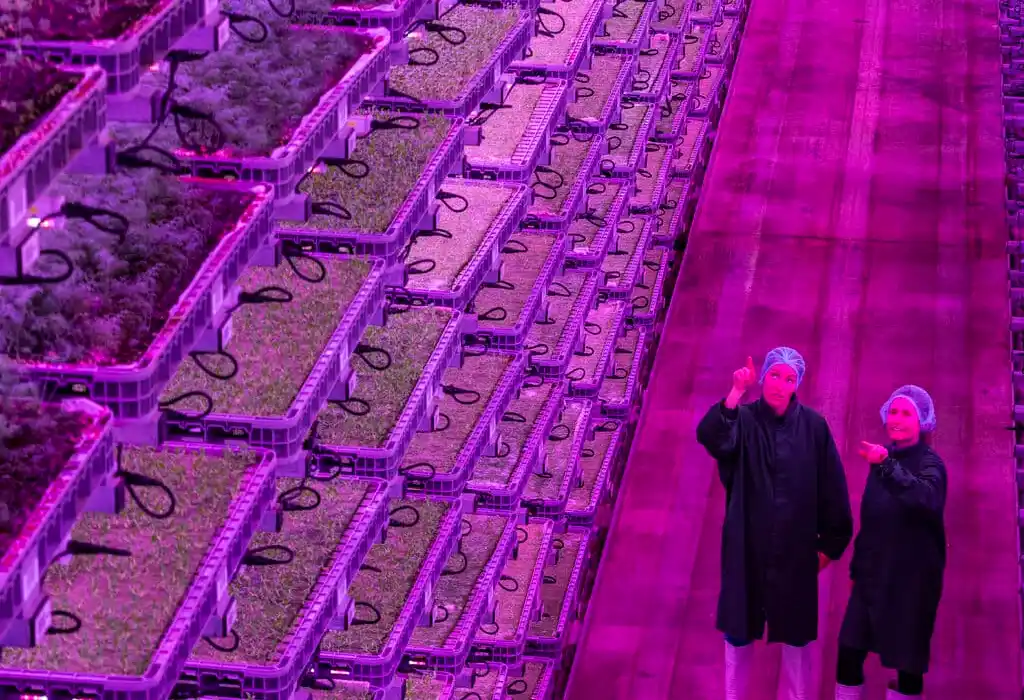Key Takeaways
- Jones Food Company (JFC) ceased operations at its Lydney site on 7 April 2025 and entered administration.
- The company launched JFC2, its second vertical farm, in February 2024, highlighting environmental performance and year-round production.
- RSM UK has been appointed to oversee the administration, with 61 redundancies and 11 staff retained to support the transition.
- JFC’s shareholders, including Ocado Group, have been informed and confirmed the decision was made by JFC’s leadership.
- The administration follows significant investment in what was described as one of the most advanced vertical farms globally.
Jones Food Company Closes Lydney Facility, Administration Begins
Vertical farming operator Jones Food Company (JFC) has entered administration, Fresh Produce Journal reports. The company closed its facility in Lydney, Gloucestershire on 7 April 2025. A total of 61 staff were made redundant, while 11 employees remain to support site maintenance and assist the appointed administrators.
RSM UK to Manage Sale Process
Damian Webb and Stephanie Sutton of RSM UK have been appointed as administrators to manage the business and identify potential buyers for its assets.
“The company has built a state-of-the-art vertical farming facility with a highly skilled workforce,” said Webb. “There is a great opportunity for a purchaser to build on the investment to date to take the business forward.”
JFC2: A Major Investment in Sustainable Agriculture
Just over a year prior to entering administration, JFC marked a major milestone with the opening of JFC2, located near Lydney. The facility was promoted as a next-generation vertical farm, featuring:
- 3.6 acres of growing space—the size of 56 tennis courts
- 8 herb varieties and 11 salad varieties
- 90% less water use compared to conventional farming
- Operation on 100% renewable energy, functioning 24/7, year-round
- A design intended to reduce food miles and carbon footprint
Founder James Lloyd-Jones described the facility as a significant step toward producing premium, sustainable food at a competitive price while addressing long-term issues such as climate change and food security.
Scunthorpe and Bristol Facilities Also Part of JFC’s Operations
In addition to JFC2, the company operated JFC1 in Scunthorpe, previously described as Europe’s largest vertical farm, supplying an estimated 30% of the UK’s cut basil. JFC also operated the vf-Innovation Centre in Bristol, aimed at research and development in controlled-environment agriculture.
The vertical farming model used by JFC emphasized stacked growth layers, energy efficiency, and local production—all aimed at reducing agricultural impact and increasing productivity.
Ocado Confirms Decision by Board, Future Uncertain
A spokesperson for Ocado Group, JFC’s major shareholder, confirmed that investors were informed and administrators formally appointed. The decision to enter administration was made by JFC’s board and leadership team.
Enjoyed this article? Share it with your network!
- Post
- Share on Threads (Opens in new window) Threads
- Share on WhatsApp (Opens in new window) WhatsApp
- Share on Telegram (Opens in new window) Telegram
- Share on Reddit (Opens in new window) Reddit
- Share on Tumblr
- Email a link to a friend (Opens in new window) Email
- Share on Bluesky (Opens in new window) Bluesky


